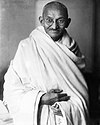


Reddit meter
The Bhagavad Gita
296 pages, 2007
The Bhagavad Gita is the best-known of all the Indian scriptures, and Eknath Easwaran’s best-selling translation is reliable, readable, and profound.
Easwaran's 55-page introduction places the Bhagavad Gita in its historical setting and brings out the universality and timelessness of its teachings. Chapter introductions clarify key concepts, and notes and a glossary explain Sanskrit terms.
Easwaran grew up in the Hindu tradition in India and learned Sanskrit from a young age. He was a professor of English literature before coming to the West on a Fulbright scholarship. A gifted teacher, he is recognized as an authority on the Indian classics and world mysticism.
The Bhagavad Gita opens dramatically on a battlefield as the warrior, Arjuna, turns in anguish to his spiritual guide, Sri Krishna, for answers to the fundamental questions of life. Yet, as Easwaran points out, the Gita is not what it seems – it’s not a dialogue between two mythical figures at the dawn of Indian history.
“The battlefield is a perfect backdrop, but Gita’s subject is the war within, the struggle for self-mastery that every human being must wage if he or she is to emerge from life victorious.”
Eknath Easwaran's interpretation of The Bhagavad Gita encourages readers to explore the concept of the 'Self'. He suggests that our true identity is not our physical body or our mind, but the eternal soul within us. This perspective can help us see beyond our immediate problems and focus on our spiritual growth.
Easwaran emphasizes the importance of detachment from the results of our actions. He suggests that we should perform our duties without expecting any rewards. This can free us from the fear of failure and help us live a more fulfilling life.
The Bhagavad Gita, as interpreted by Eknath Easwaran, highlights the importance of duty in our lives. He suggests that we should always strive to do our best in whatever role we have been given, without worrying about the outcome. This can lead to a sense of contentment and peace.
Easwaran's interpretation of The Bhagavad Gita provides a roadmap to enlightenment. He encourages readers to meditate, practice self-discipline, and cultivate a sense of compassion towards all beings. These practices can help us attain a state of inner peace and clarity.
In his book, Easwaran highlights the importance of love and devotion in our spiritual journey. He suggests that by cultivating a deep love for God and all beings, we can transcend our ego and experience a sense of oneness with the universe.
Quotes 5
When doubts haunt me, when disappointments stare me in the face, and I see not one ray of hope on the horizon, I turn to Bhagavad-Gita and find a verse to comfort me; and I immediately begin to smile in the midst of overwhelming sorrow. Those who meditate on the Gita will derive fresh joy and new meanings from it every day.
 Mahatma Gandhi - Indian Freedom Fighter
Mahatma Gandhi - Indian Freedom FighterIn the morning I bathe my intellect in the stupendous and cosmogonal philosophy of the Bhagavad Gita, in comparison with which our modern world and its literature seem puny and trivial.
 Henry David Thoreau - American Philosopher
Henry David Thoreau - American PhilosopherI owed a magnificent day to the Bhagavad Gita. It was the first of books; it was as if an empire spoke to us, nothing small or unworthy, but large, serene, consistent, the voice of an old intelligence which in another age and climate had pondered and thus disposed of the same questions which exercise us.
 Ralph Waldo Emerson - American Essayist
Ralph Waldo Emerson - American EssayistWhen I read the Bhagavad-Gita and reflect about how God created this universe everything else seems so superfluous.
 Albert Einstein - Theoretical Physicist
Albert Einstein - Theoretical PhysicistThe idea that man is like unto an inverted tree seems to have been current in bygone ages. The link with Vedic conceptions is provided by Plato in his Timaeus in which it states...' behold we are not an earthly but a heavenly plant.' This correlation can be discerned by what Krishna expresses in chapter 15 of Bhagavad-Gita.
 Carl Jung - Psychoanalyst
Carl Jung - Psychoanalyst




The Bhagavad Gita found in libraries
1Meditation Books
Achieve desired peace of mind and body with ease by reading the best Meditation Books from our collection.











